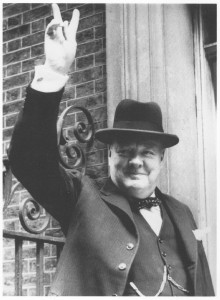Churchill Qualities: Leadership, Judgment, Humanity
 Qualities
Qualities
Written for a colleague who asked various contributors for 300 words on the qualities of Winston Churchill they most admire.
Leadership
Few great leaders are also great writers; none who were both compare with Winston Churchill. In 1940 he saved civilization by keeping Britain in the fight until those “who hitherto had been half blind were half ready.” His historical and biographical eloquence won a Nobel Prize. Uniquely for a politician, he thought and wrote deeply about the nature of man. He hated and tried to prevent war. He fought to preserve constitutional liberty.
Judgment
Laboring forty years in the vineyard of his words, I was struck by his judgment. An eminent historian recently wrote me: “The more I learn about him, the more I think what good judgment he had, especially in the 1920s.” The 1920s? Yes. Two decades before his finest hour, Churchill helped ensure Irish independence, made some sense of the Middle East, settled war debts, took both sides in the General Strike, and wrote tax-cutting budgets.
True, he sometimes judged wrong. Yet as William Manchester wrote, “he always had second and third thoughts, and they usually improved as he went along. It was part of his pattern of response to any political issue that, while his early reactions were often emotional, and even unworthy of him, they were usually succeeded by reason and generosity.”
Sir Martin Gilbert, his chief biographer, who knew more about him than anyone, said: “I never felt that he was going to spring an unpleasant surprise on me. I might find that he was adopting views with which I disagreed. But I always knew that there would be nothing to cause me to think: ‘How shocking, how appalling.’”
Humanity
Withal Churchill carried with him a joyous humanity. Asked what he admired most in him, Marshal Tito, a most perceptive man, instantly replied: “His humanity. He is so human.” I certainly agree on at least one thing with Marshal Tito.






